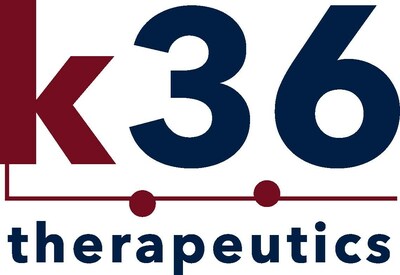
Initial patients dosed in multiple cohorts of the Phase 1 dose-expansion study assessing KTX-1001 in combination with standard of care and mezigdomide for t(4;14) multiple myeloma
Company enters into supply agreement with Bristol Myers Squibb for the novel investigational treatment mezigdomide
CAMBRIDGE, Mass., Sept. 16, 2025 /PRNewswire/ — K36 Therapeutics, Inc. (“K36”), a privately held clinical-stage biotechnology company developing novel, targeted therapies for cancers with unmet medical need, today provided a clinical update on its lead asset, KTX-1001 for multiple myeloma (MM).
The company has initiated patient dosing in an expansion cohort evaluating KTX-1001, its first-in-class NSD2/MMSET inhibitor, in combination with carfilzomib and dexamethasone (NCT05651932). NSD2 (also known as MMSET) is overexpressed in MM patients with the t(4;14) chromosomal translocation, one of the highest-risk genetic subtypes of the disease.
In addition, K36 has begun dosing patients in a separate cohort evaluating KTX-1001 in combination with mezigdomide, a novel investigational therapy from Bristol Myers Squibb (BMS) currently completing enrollment in two pivotal late-stage trials. To enable this study, the companies have entered into a clinical trial supply agreement, under which K36 will sponsor and run the trial to evaluate the novel triplet of KTX-1001, mezigdomide and dexamethasone in patients with relapsed and refractory MM (EUCTR: 2022-500801-41-00). K36 retains all development and commercial rights to KTX-1001 and is free to expand its use in other agents.
“We are excited to see the dose expansion cohorts open in the U.S. and EU and to see continued momentum for KTX-1001, an oral therapy we believe holds great promise to transform outcomes in multiple myeloma,” said Terry Connolly, Ph.D., President and Chief Executive Officer of K36. “Despite advances that have extended survival for people living with MM, this challenging blood cancer remains incurable, and most patients eventually relapse. There is an urgent need for therapies that are both effective and convenient, enabling patients to receive care in community settings while also maintaining quality of life. We are deeply grateful to the patients, investigators, and their care teams for their commitment to advancing this important research. The favorable tolerability profile of KTX-1001, together with promising early signs of clinical activity, underscores its potential as a first-in-class targeted therapy for patients with t(4;14) multiple myeloma, and our agreement with BMS enables us to further explore its potential benefit in novel combinations.”
“The combination of KTX-1001 with mezigdomide represents an exciting therapeutic opportunity for patients with high-risk t(4;14) multiple myeloma,” said Dr. María-Victoria Mateos, MD, PhD, Director of the Myeloma Program and the Clinical Trials Unit in Salamanca’s University Hospital and Associate Professor of Medicine at the University of Salamanca, Spain. “This cohort builds on compelling preclinical evidence showing that KTX-1001 works synergistically with mezigdomide. With the first patient now dosed in this novel-novel cohort, we are encouraged by the potential of this approach to improve outcomes.”
K36-MMSET Phase 1 Clinical Trial Details
K36 has opened all U.S. sites for its Phase 1 trial evaluating the safety and tolerability of KTX-1001 in combination with standard of care agents, as well as a novel combination with mezigdomide in Spain and France. The trial’s primary objectives are to determine the provisional recommended Phase 2 dose (RP2D) for these combinations, with additional objectives including assessment of efficacy and further safety characterization. The company anticipates reporting initial data in mid-2026.
KTX-1001 is designed to selectively inhibit NSD2 and reduce levels of the epigenetic mark H3K36me2, restoring balance to gene expression and re-sensitizing tumor cells to therapy. In preclinical models, KTX-1001 reduced H3K36me2 levels in t(4;14) multiple myeloma, suppressed tumor growth and triggered cancer cell death in NSD2-high cell lines, and showed strong synergy when combined with proteasome inhibitors and immunomodulatory drugs. Early clinical data demonstrate clear evidence of target engagement through H3K36me2 suppression in patient samples and emerging signs of clinical activity in heavily pretreated patients, with a safety profile that supports ongoing evaluation of this novel epigenetic approach.
“Given the favorable safety profile we have already seen with KTX-1001, we are pleased to be able to participate in this next cohort evaluating KTX-1001 in combination with carfilzomib,” said Edward Stadtmauer, MD, and principal investigator at Abramson Cancer Center at the University of Pennsylvania Perelman School of Medicine. “The emerging efficacy signals from this combination are encouraging. As an oral agent, KTX-1001 holds potential for use in earlier lines of therapy, both as a monotherapy and in combination with standard of care regimens.”
About KTX-1001
KTX-1001 is a novel, first-in-class, potent, and selective methyltransferase inhibitor of the catalytic activity of MMSET/NSD2. It is an orally administered small molecule developed initially for the treatment of relapsed and refractory multiple myeloma, with a focus on patients with the t(4;14) translocation. This inhibitor offers a promising avenue for addressing this challenging high risk patient population.
About Multiple Myeloma
Multiple myeloma (MM) is the second most common hematologic malignancy, driven by the uncontrolled proliferation of plasma cells in the bone marrow. According to the American Cancer Society, approximately 36,000 new cases are diagnosed each year. While recent therapeutic advances have extended survival, MM remains incurable, and most patients eventually relapse. High-risk MM, defined by genetic abnormalities such as t(4;14) and other adverse prognostic markers, is associated with aggressive disease biology, shorter survival, and limited benefit from standard-of-care regimens. Addressing this high-risk population represents one of the greatest unmet needs in myeloma research and treatment.
About the KTX-1001 Phase 1 MMSET Clinical Trial
The Phase 1 clinical trial is a single-arm, open-label study in participants with relapsed and refractory multiple myeloma. It is a multi-part study with dose escalation followed by an expansion cohort in patients with the genetic translocation t(4;14) to evaluate the safety, tolerability, and preliminary efficacy of different doses of KTX-1001 in combination with standard of care and mezigdomide. For more information and participating centers, visit NCT05651932 and EUCTR: 2022-500801-41-00.
About K36 Therapeutics, Inc.
Founded in February 2021, K36 Therapeutics is a privately held biotechnology company backed by Atlas Venture, F-Prime , Eight Roads Ventures, Nextech and Bristol Myers Squibb. Our mission is to translate epigenetic modulation of oncogenic pathways into first-in-class small molecule therapeutics for the benefit of cancer patients worldwide. For more information, please visit www.k36tx.com and follow us on LinkedIn.
CONTACTS
K36 Therapeutics
Soo Bang
[email protected]
Media:
Sarah Sutton
(518) 932-3680
[email protected]
View original content to download multimedia:https://www.prnewswire.com/news-releases/k36-therapeutics-provides-clinical-update-on-ktx-1001-in-multiple-myeloma-302556647.html
SOURCE K36 Therapeutics





